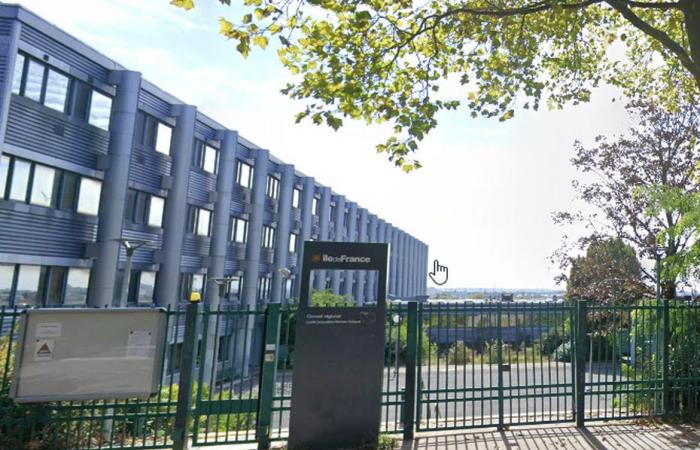Around fifteen cases of breast and pancreatic cancer were detected among teachers and staff at the Romain Rolland high school, in Ivry-sur-Seine, in Val-de-Marne. The unions are questioning potential pollution, while the ARS has opened an investigation.
Company
From daily life to major issues, discover the subjects that make up local society, such as justice, education, health and family.
France Télévisions uses your email address to send you the “Society” newsletter. You can unsubscribe at any time via the link at the bottom of this newsletter. Our privacy policy
“I am not at all sure of the link between the establishment and my personal case, but I have a question: it is perhaps not a coincidence.” At 45, Valérie Chemin, professor of classics since 2006 at the Romain Rolland high school in Ivry-sur-Seine (Val-de-Marne), found herself with breast cancer which caused her “fell on it”. With no history of cancer in her family, leading a life that she considers to be rather healthy, this teacher has also not made the connection with her professional environment, to the point of making a surprising discovery: she is not the only one to have recently fallen ill.
It was already five years ago. Since then, the unions believe that 16 teachers or staff members of the comprehensive high school were diagnosed and/or died of cancer in ten years, between 2010 and 2019. There is talk of several breast and pancreatic cancers, with certain teachers teaching in classes adjoining that of Valérie Chemin. An alarming figure, which was transmitted to the rectorate in 2021. However, the investigation seems to have only begun, with the first steps taken by the Regional Health Agency, in October 2024.
Could this be a consequence of asbestos contamination, traces of which were found during work on the high school gymnasium? Or pollution linked to the Ivry-sur-Seine waste incinerator, the largest in Europe, located just three kilometers away, and whose releases of toxic particles have already been singled out? No link has yet been established.
But on the union side, we deplore the delay in taking this matter into account. “Two and a half years after our first official alert (in 2022, editor’s note.) the first colleagues with cancer were called by the ARS”indicate the staff representatives. Valérie Chemin actually says she was contacted in mid-October 2024 by a nurse mandated by the health authority, “who asked me questions about my journey and asked for my consent to consult my medical file, while waiting for the agreement of the hospital structure which followed me”.
However, reminders were made “several times a year”, adds the teacher at the origin of the alert, who “didn’t see anything coming”until the first elements appeared in the press, a year ago, at the end of 2023. It was at this time that the ARS Île-de-France indicated that it had been contacted by the rectorate “to assess a potential link between reports of cancer among staff at the Romain Rolland high school and environmental dioxin contamination in this town” linked to the incinerator, she writes to us. By press release, the ARS confirms that “l“Investigations, carried out in accordance with national recommendations, are still ongoing.” et “require in particular to obtain, from the persons concerned, authorization to access their hospital medical files, with the aim of assessing the potential causes of these pathologies”.
Despite this delay, the professor says she is reassured to finally see things moving. “Now we are heard. I am simply wondering whether there are more cases of cancer here than elsewhere. If it allows us to do prevention, it seems useful to me.”
From now on, the staff representatives are requesting an epidemiological study, and in particular measurements of air quality, but also readings in the water, floors and surfaces inside and outside the high school, as well as “as a biomonitoring study based on measurements of the impregnation of the staff and students of the establishment”.
An evaluation of the means of ventilation of buildings could be undertaken by the end of the year, according to the union committee. But regarding the search for potential pollutants in the air, including dioxins ( persistent and toxic molecules) and eternal pollutants (PFAS), this indicates that the rectorate has only announced that it will produce quotes. Contacted, the Academy redirected us to the ARS. A year ago, the agency, however, estimated “very unlikely” the existence of a link between the incinerator and cases of cancer in high school, relates The Parisian.
The pollution emitted by this factory, which processes thousands of tonnes of household waste per year, also continues to be closely monitored by environmental associations. In 2021, a first scientific study by the Dutch NGO ToxicoWatch revealed a significant concentration of dioxins around this incinerator, located between Paris XIII and Ivry-sur-Seine, thanks to the analysis of eggs and plant moss nearby. . A report which led the ARS to request an expertise (the conclusions of which we still do not know) and to recommend pending the “non-consumption of eggs and animal products from chicken coops” located in the affected and neighboring municipalities, such as Charenton-le-Pont and Alfortville, for example.
This fall, Dutch researchers are back to carry out a new biomonitoring study, announces the partner environmental protection collective 3R. It will indeed be a question of determining whether dioxin pollution is continuous from year to year, or whether it is of ancient origin. In all cases, dysfunctions in the monitoring of toxic emissions have already been detected by the associations. While Sycom, which owns the incinerator, always indicates values consistent with regulatory standards, the researchers found thatbetween 2020 and 2021, the dioxin emission sensors did not operate continuously. There are 7,000 hours of data missing, during which it is therefore impossible to say whether incineration abnormally polluted the air and the environment.






